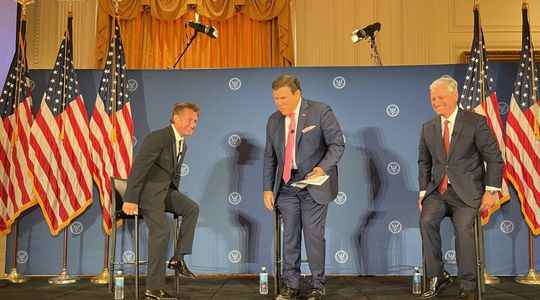Extraordinary Actor as a Gay Politician (Harvey MilkOscar for best role), committed director, journalist in his spare time (he did the last interview with the drug trafficker “El Chapo” Guzmán for Rolling Stones in 2015), friend of Hugo Chavez and slayer of the Iraq war, Sean Penn, 61, has always been a man of ideas. In this early spring, the ex-husband of Madonna and actress Robin Wright (Santa Barbara, House of Cards) is once again where you least expect him. A certified Democrat, he accepted the invitation of the Richard Nixon Foundation where, on a platform, he debates, in front of 300 people, the Ukraine war with the Republican Robert O’Brien, who is the former national security adviser of Donald Trump at the White House. The lunch-debate is hosted by a Fox News star in front of an audience of 350 people who paid $100 to attend the happening.
The actor is just back from Ukraine where he was shooting a documentary when the war broke out. At table number 27, where L’Express is also located, a woman leans towards her neighbor: “He is on the left but I like him, Sean Penn; he comes to speak in front of a 100% Republican room, it’s good”, she rejoices without measuring that her words say something about America and, also, about the mistakes of Vladimir Putin. Indeed, the master of the Kremlin believed deeply in American society, whereas on questions of foreign policy, Democrats and Republicans almost always agree on the essentials.
Perpetuate the memory
In the very conservative county of Orange, adjoining that of Los Angeles, the Richard Nixon Foundation is one of those presidential foundations whose mission in the United States is to preserve the archives and perpetuate the memory of the former tenants of the White House. The country has twelve of the same according to a tradition that dates back to Franklin D. Roosevelt (1933-1945). Both a library and a museum, they are both a documentation center for researchers, museums and meeting places where American history, presidential legacies and political news are debated. “Each occupies a niche, explains President Jim Byron. on aid to Haiti and 9/11 is a major topic of the George W. Bush Foundation in Texas.” In Chicago, the Obama Foundation, which has benefited from a fundraising of 1 billion dollars, is still under construction. And, to date, no Donald Trump foundation project has been launched.
“As for us, our specialty is foreign policy, resumes Byron whose office his office adorned with posters of Nixonian electoral campaigns, because no president since the second world war has had a greater influence on geopolitics than Richard Nixon.” Vice-president of Eisenhower for eight years, which he used to travel the world and forge friendships with Churchill and de Gaulle, the Californian arrived at the White House with a solid international experience. Having become president, he succeeded in 1972, with the help of his diplomatic adviser Henry Kissinger, in one of the greatest “coups” of realpolitik in history: the opening of dialogue with China to better weaken the Soviet Union. . “Until the outbreak of war in Ukraine by Russia and the ‘unlimited’ cooperation agreement announced by Putin and Xi Jinping, we lived in a Nixonian world”, adds the president of the foundation, which employs 50 people in a building as big as a conference center. Nixon is also the author of the “madman’s theory”, this doctrine of deterrence based on unpredictability which made it possible to bring Ho Chi Minh to the negotiating table to end the Vietnam War during the Paris agreements in 1973. The same year, he took advantage of the end of the Yom Kippur War to tip Egypt into the American orbit, making Cairo a stabilizing force in the Middle East until 2010.
Nixon, father of political realism
Unfortunately for his posterity, all this was erased by the Watergate affair which started exactly half a century ago (with the burglary of the Democratic Party headquarters on June 17, 1972) to lead to the resignation of the president in 1974. “However, the perception vis-à-vis my grandfather begins to change, wants to believe Chris Nixon, the grandson while showing the helicopter, kept at the foundation, which took his grandfather after his resignation in 1974. Like Bill Clinton, who pronounced his eulogy in 1994, more and more historians recognize the major role of the one who is the father of “realism” in geopolitics, who distinguishes himself from “schools” isolationists (Trump), neoconservatives (Bush), interventionists (Clinton).
Convinced of the relevance of Nixonian thought, the foundation of the same name therefore launched, under the aegis of Henry Kissinger, who is 98 years old, a “seminar” The idea? “Getting the rising generation of the Republican Party together once a month so that they are ready to deal with international issues when we return to the White House in 2024”, answers Robert O’Brien without blinking. Speakers range from Peter Thiel, the founder of PayPal who gave a lecture on cryptocurrencies and China, to Rick Perry the former Trump energy secretary who led a seminar on energy independence. “Each time, we take a subject and think about how Richard Nixon would have approached it,” says Jim Byron. Fifty years after Watergate and a quarter of a century after the death of the person concerned, Republicans are increasingly convinced that Nixonian thought is not dead.
Axel Gylden
